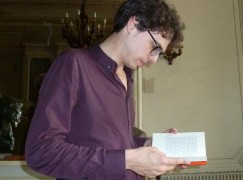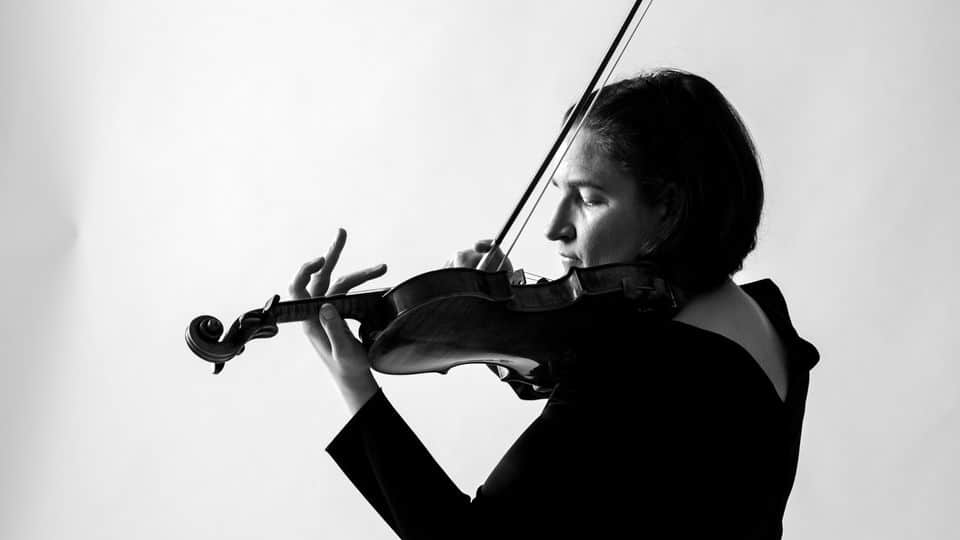Lucas Debargue: Some classical pianists are not full musicians
mainThe refreshing French pianist has given a characteristically frank interview to Elijah Ho for KQED in San Francisco. Here are some unpublished extracts, transcribed exclusively for Slipped Disc:

On fellow-pianists: ‘Today, you can come out on stage with a nice smile and the First Piano Concerto of Chopin and be considered a master of piano. For me, that’s totally meaningless. For me, it doesn’t mean anything to be a master of the piano. You can be a master of the piano without being a musician at all…I like Bebop very much – Charlie Parker, Bud Powell and all of these other musicians. Erroll Garner is a world by himself. I put them before some of the classical players. Some of the classical players can’t do anything but learn and perform – they do so very nicely, but they’re not full musicians.’
On a rumour that his parents were unsupportive of his playing: ‘That was terrible. I know I talk a lot, and sometimes I say some things. Maybe you’re a parent yourself, but imagine how my parents felt reading something like that? It doesn’t cost a journalist anything to write something like that, but it cost my parents a lot.’
On competitions and perfectionism: ‘This system of teachers presenting their students in competitions, being jury members at these competitions themselves, looking for certain ways to play, using references of playing instead of the score itself, it’s very painful for me. I would like to play more Liszt and more Chopin, but I feel desperate. Before I play one note, there are already so many people waiting to find something wrong with my playing. They will say, ‘Ah it’s not the way it should be!’ But for me, what should be is the music. It’s not my freedom, my original idea. I try as much as possible to be honest, to find the best way to express what the music has to communicate. With Scarlatti, for example, I don’t play just one way because he’s a Baroque composer. Baroque is a huge thing and you can’t possibly associate it with all people who lived in that time. We are living in the age of Trump – does that mean we must all be little Trumps ?””
On pop music: ‘Oh, I think there are a lot of very interesting and good things in pop music. I would not shit on pop music. I think there are strong composers, singers, strong drummers, etc. For me, the problem is not shit. There’s a lot of shit out there. The problem is we are not talking enough about what is good. There is a lot of good, but the accent is put on the shit. Look at cinema. There are a lot of good movies, but people are always talking about the bad ones. Why do we do this?’
On music critics: ‘Plenty of critics are probably frustrated people who can’t do 10% of what the musicians do. It’s too easy. It’s even strange that people who do these things don’t feel ashamed of doing so. Because there’s a lot to feel ashamed about when you live like this. So, whatever…’
Read on here for the official transcription.






Bold and beautiful 🙂
Refreshing young man ! What it says about musical critics is so true !
What is it with young people today, or is a European thing? Can’t they speak without using foul language? In private conversation, fine. But for public consumption how about showing a little class.
It ‘s not a very effective form of communication either, particularly when overused.
On the other hand, he seems keen to demonstrate how cool and unelitist he is.
It’s incredible what you can do with just a few words. Miles Davis, for example, “wrote” an autobiography using almost only 4-letter words.
I agree with you.
However as Maria says, he’s probably desperately trying to be unstuffy and show that classical pianists are cool kids.
Actually I thought he was very aware and precise in his use of profanity. I might have missed something, but in the whole interview he says “shit” four times all in the same paragraph, and “bullshit” when describing what he initially thought of his current teacher’s approach. If he was a mindless user of profanity, he would be tossing it everywhere (“Chopin op. 10 #4 is just so f***ing hard” or whatever). So it looks to me like he chose when and how to deploy it.
Of course he could have different words. He could have said “I wouldn’t dismiss pop music…. there’s a lot of garbage out there…” etc., but it wouldn’t have had the same — call it “bite” or call it “offensiveness,” it seems to be what he was aiming for.
I think you are all making too much of Lucas’s use of ‘foul’ language. You forget that his mother tongue is French and that he is not fluent in English by far. This interview was given verbally over the phone. I’ve heard Lucas speak English–he always speaks fast and if he cannot think of the right word on the spot, he uses another one, usually less precise. I’m sure that he understands them, but I suspect that words like ‘dismiss’ or ‘garbage’ would not come to him spontaneously as he speaks–speaking a foreign language is the last and most difficult step in learning it. I have heard Lucas give interviews in French and spoken with him personally and I have not once heard him use ‘foul’ language in French. I’m not saying that he is unaware of the meaning of ‘shit’, I’m sure he is, but he may very well be unaware that the word can be more shocking in English than its french equivalent ‘merde’.
Obviously a graduate of the Nigel Kennedy School of The Lowest Common Denominator. Poor things, both; I pity them for their insecurities, lack of class and lack of linguistic talent. Why bovva, say I.
LOL. Oh Holly, you’re adorable.
He seems to be an inquisitive musician, and at the same time, frustrated with perceptions, misconceptions and judgement. When one is young, and finds this bothersome, they let it be known. What Lucas will most probably find himself doing over the course of his career, is work around these impediments and bring his own, unique brand of musicianship to his audiences, and bring his individual voice to his interpretations. One thought for Lucas would be to begin the process of getting new works commissioned for him, to establish himself not only as an interpreter of the traditional music, but perhaps to find composers who can compose exclusively for him blending the styles of music he enjoys most. This way, it becomes like a tailored suit, just for him, to bring to the world. And let’s not forget that would be a legacy for future generations.
I don’t see how he is frustrated, on the contrary – he is more like a free soul who is not afraid to say what he thinks. About new works – he composes himself and performed already some of his pieces, maybe this is almost the same.
Perhaps so. Regarding new music–it is fabulous that he creates his own music. I hope he will also explore new works composed for him based on his own musical likes.
What he says is very true. Many musicians today, especially pianists, have no understanding of the creative aspect of music but only the performance aspect, little more than trained monkeys. In Mozart’s time, performance and creation were inextricably linked.
Just yesterday he taught a masterclass at the International Piano Festival at the University of Houston (Texas, USA). Lucas is a VERY enthusiastic and articulate young man. After hearing him coach an even younger man in Gaspard, I eagerly look forward to his performance tonight of that, the Chopin 4th Ballade, and the Medtner Sonata Op.5. .
I don’t know what you thought, but I found the Houston recital very disappointing. Why ONE Scarlatti Sonata to start? They really need to be in pairs, especially if you start with a more ruminative one. Obviously, the audience was confused (perhaps the intent?) and he launched into the Chopin sans applause. The Chopin was utterly devoid of shaping/phrasing or coherence. He waited until the music got loud and fast and then started to pound and rush. The coda was robotic yet unclear. Gaspard had moments of scintillating textures and panache, but virtually no color. Some very odd disjunct pauses had me scratching my head. The Medtner was seemingly more his metier. Rather a daring programming choice, but a refreshing one. There was much more emotional connection to this work, if still some very rushed and garbled moments (he never clarified the “16ths” in the 1st mvt. that were embedded within the 8th notes). Strange that the encores were unaccounted, since they were certainly unfamiliar to the audience. The 2nd one (Kapustin?) was probably the best playing of the evening.
Very odd as I heard the same recital in Berkeley, CA on Sunday Feb. 11 and fell head over heels re: the playing… as communicated in my blog: https://arioso7.wordpress.com/2017/02/13/run-to-hear-pianist-lukas-debargue/
By the way I corrected the spelling of Lucas in the text.
I thought the Chopin was particularly divine as was the entire program. And I loved the encore Scarlatti Sonatas.. added to the opener.
his lucidity of thought never ceases to impress. Brings to mind Stravinsky’s “I haven’t understood a bar of music in my life, but I’ve felt it.”
Michelangeli, Richter, Argerlch, Zimmermann,Arrau to name just a few have set a standard in pianism and interpretation that speaks for itself.
Whether they compose, like Jazz and pop, drive a car or ride a bicycle, are vegans or enjoy meat loafs, who cares ?
What a superficial, typically trendy and empty statement.
Enough said.
Here is one of these “incomplete musicians” I enjoy very much :
https://www.youtube.com/watch?v=eJ5W8y2rJ94
Actually it’s not “trendy.” I’ve heard the “incomplete musician/trained monkey” critique from musicians who compose, directed at musicians who don’t, for a long time. Not sure what the basis for it is, since there have been many very insightful musicians who don’t compose.